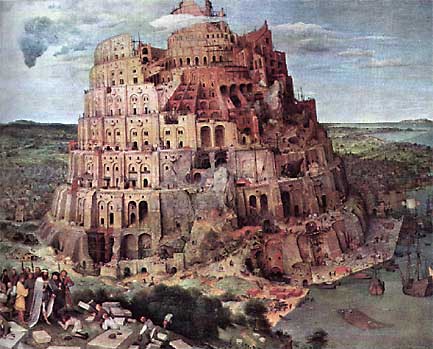

|

|
| The people of Babel said, "Come, let us build ourselves a city, with a tower that reaches to the heavens, so that we may make a name for ourselves and not be scattered over the face of the whole earth." (NIV). |
The descendants of Noah all spoke a single language. As they increased in number and began to spread eastward, they found a fertile area called Shinar and settled there. They decided to build a city with a tower that "reached to the heavens." They wanted the tower to be a proud monument to themselves and a symbol that would keep them united as a powerful people.
However, God was not so pleased. He came down and looked at the city and tower and said,
If as one people speaking the same language they have begun to do this, then nothing they plan to do will be impossible for them. Come, let us go down and confuse their language so they will not understand each other. (NIV, Genesis 11:6-7)
So God made the people speak many different languages so they could not work together on building the city and tower. The He scattered the people around the world and the city was abandoned. The city was called "Babel" because God confused their languages.
In ancient times, people thought the heavens were not far above the earth. If only they could build a tower to the sky, they could climb up and be like gods themselves. Mankind had once again lost sight of God and become arrogant and self-sufficient.
God, of course, saw this as pure arrogance. He put an end to the people's delusions of being powerful and important like gods.
We may be tempted to think we no longer need to trust and obey God. We may believe our learning, sophistication and technology are all we need to be self-sufficient and guarantee our security. The lesson of the Tower of Babel is that such self-sufficiency is a delusion. History has shown that many nations and their leaders have fallen into the trap of arrogance and self sufficiency. Like Babel, those nations have eventually ended up in ruins.